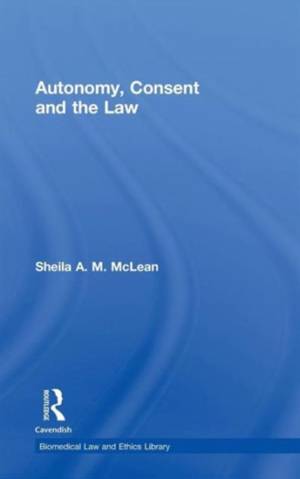
- Retrait gratuit dans votre magasin Club
- 7.000.000 titres dans notre catalogue
- Payer en toute sécurité
- Toujours un magasin près de chez vous
- Retrait gratuit dans votre magasin Club
- 7.000.0000 titres dans notre catalogue
- Payer en toute sécurité
- Toujours un magasin près de chez vous
Description
Autonomy is often said to be the dominant ethical principle in modern bioethics, and it is also important in law. Respect for autonomy is said to underpin the law of consent, which is theoretically designed to protect the right of patients to make decisions based on their own values and for their own reasons. The notion that consent underpins beneficent and lawful medical intervention is deeply rooted in the jurisprudence of countries throughout the world. However, Autonomy, Consent and the Law challenges the relationship between consent rules and autonomy, arguing that the very nature of the legal process inhibits its ability to respect autonomy, specifically in cases where patients argue that their ability to act autonomously has been reduced or denied as a result of the withholding of information which they would have wanted to receive.
Sheila McLean further argues that the bioethical debate about the true nature of autonomy - while rich and challenging - has had little if any impact on the law. Using the alleged distinction between the individualistic and the relational models of autonomy as a template, the author proposes that, while it might be assumed that the version ostensibly preferred by law - roughly equivalent to the individualistic model - would be transparently and consistently applied, in fact courts have vacillated between the two to achieve policy-based objectives. This is highlighted by examination of four specific areas of the law which most readily lend themselves to consideration of the application of the autonomy principle: namely refusal of life-sustaining treatment and assisted dying, maternal/foetal issues, genetics and transplantation.
This book will be of great interest to scholars of medical law and bioethics.
Spécifications
Parties prenantes
- Auteur(s) :
- Editeur:
Contenu
- Nombre de pages :
- 246
- Langue:
- Anglais
- Collection :
Caractéristiques
- EAN:
- 9780415473392
- Date de parution :
- 17-08-09
- Format:
- Livre relié
- Format numérique:
- Genaaid
- Dimensions :
- 156 mm x 234 mm
- Poids :
- 521 g

Les avis
Nous publions uniquement les avis qui respectent les conditions requises. Consultez nos conditions pour les avis.






